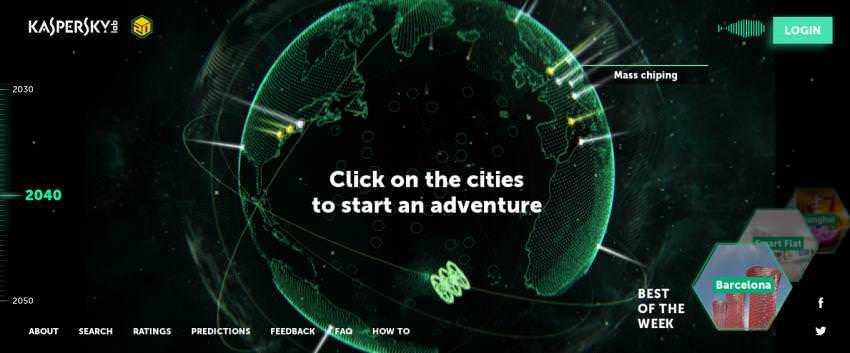H Kaspersky Lab, celebrating this year's 20 market, today announced the launch of the "Earth 2050”, or “2050 Earth” a websiteσελίδα which gathers predictions for social and technological developments for the next 30 years. 
Kaspersky Lab has collaborated with futurists like Ian Pearson, has added the vision for the future of its own researchers and has talked with artists and scientists to develop a realistic view of the not too distant future. Users can shape their own vision for the future by studying over 200 forecasts, and are also asked to submit their own visions to add to the site.
Kaspersky Lab wants to understand how the world will look in the near future to better understand the challenges that such a future will bring.
If all our lives are digitized, how do we handle privacy? If people have all their devices implanted inside and their cloud data, how do we protect the data? And very specifically for Kaspersky Lab: if there are no terminals anymore, the industry is moving faster to provide security solutions that are tailored to the conditions customers take, no matter what device they use?
Andrey Lavrentyev, Head of Technology Research Department of Kaspersky Lab, said:All predictions you can find on Earth 2050 could be a reality in just two decades. "Earth 2050" is not just a creative exercise for us. For the last 20 years, its experts Kaspersky Lab have been struggling with digital crime and have seen threats evolve in the meantime. As a result, they are able to share their knowledge and experience and - in many cases - encourage users to think more carefully about the security of future technologies. Although inventions can be amazing - such as driverless cars, smart infrastructure and the ability to share medical data between doctors worldwide - they can still cause problems. Each of them brings a whole new world of opportunities for digital criminals to exploit. "
At the moment, Earth 2050 includes forecasts for 80 cities around the world. Users can choose any of these cities and forecasts will appear at the top of the map. The site is divided into three time categories: 2030, 2040 and 2050, each of which contains predictions from people who are recognized as experts in their fields. For example, users can explore the thoughts of Ian Pearson and various Kaspersky Lab specialists about what the future holds for us.
The forum is not limited to written predictions. "Earth 2050" also includes 12 VR viewable panoramas of cities such as Barcelona and Shanghai, as well as images of various objects from the future. Users can take a 360º look at how cities could work in the future. Will we be able to customize the appearance of every person we see on the street? Will we have invented a dress that will change its style? Are driverless cars the future of business? taxi in "smart" cities? Will we see ads while we sleep? These questions are just a taste of the kind of information the user will be able to find on the website.
The dedicated comment form allows visitors to add their own ideas to the portal. These will be published once they have been reviewed by the editorial team. Users can discuss existing predictions, but also contribute their own. New content from the experts and predictions submitted by different sources will be frequently displayed on the website. "However, we hope to see many more names on the website and encourage our users and site visitors to send us their craziest ideas about how you can look like the future", Commented Andrey Lavrentyev.





